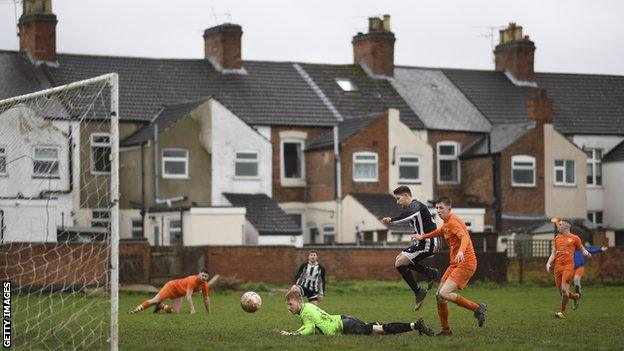Coronavirus: What do the latest restrictions mean for grassroots sport in England?
- Published

Amateur football can continue outdoors provided it is formally organised and complies with Covid-19 secure guidelines
New restrictions to try to stop the spread of coronavirus in England will have a significant impact on sport at grassroots level.
Though gyms, swimming pools and playing fields remain open, there will be tighter restrictions on what can and cannot take place.
Below is a guide to how different sports are affected.
You can find the full guidance for these and other sports here, external and be aware of the local restrictions also in place., external
Football
Indoor five-a-side is now prohibited as the new regulations only allow indoor activity in groups of no more than six, or where groups of six will not mix.
Adults can continue to play outdoors in groups of more than six provided sessions are formally organised, for instance by a governing body, club, business or qualified coach. So that means you can continue to play for your Sunday league 11-a-side team or in organised leagues at pitch operators.
Whoever is organising formal matches must conduct a risk assessment and ensure compliance with Covid-19 secure guidelines, which includes players arriving changed and ready to play, social distancing during warm-ups and avoiding equipment sharing.
Informal games of any sport - such as a kickabout with your mates at the park - will have to stick to the "rule of six" - or the localised lockdown rules in your local area - otherwise you could be fined.
Children's football, both indoor and outdoor, is exempt from the new regulations and able to continue as before.
Cricket
Adult matches and outdoor training can continue as before, provided they are organised officially and in compliance with Covid-19 secure guidelines - so no informal matches on your local pitch or a knockabout in the nets (in groups of more than six).
Indoor training in groups of more than six is now prohibited. The England and Wales Cricket Board (ECB) says it will continue to work with the government in the next few days to produce further guidance.
Children's matches and training, both indoor and outdoor, are exempt from the new rules and can continue as before.
Rugby union
Adult outdoor training and non-contact matches can continue as before, provided they are organised officially and in compliance with Covid-19 secure guidelines.
Any training sessions should involve no more than "limited and restricted contact" as per the guidelines from the Rugby Football Union (RFU)., external
Indoor training in groups of more than six is now prohibited.
Children's matches and training, both indoor and outdoor, are exempt from the new rules and can continue as before.
Netball
Netball is subject to the "rule of six" regulations, meaning it cannot take place indoors unless it involves a group of no more than six or where groups of six will not mix.
The new rules permit netball to take place outdoors, provided it is organised officially and in compliance with Covid-19 secure guidelines.
Children's netball, both indoors and outdoors, can continue as before.
Netball England says it is continuing to follow government announcements and will provide a further update on what it means for the sport at grassroots level soon.
Basketball
Indoor basketball involving groups of more than six will be prohibited under the new regulations. Outdoor basketball can continue in larger groups, providing it is organised officially and in compliance with Covid-19 secure guidelines.
Children's basketball, both indoors and outdoors, is exempt from the new regulations and able to continue as before.
Basketball England says it is seeking further clarification from the government in relation to how the announcements affect its return-to-play plans.
Disability sport
Organised disability sports, both indoor and outdoor, are exempt from the new regulations so can continue as before.
Exercise classes
Organised outdoor exercise classes for adults can still take place in groups of more than than six, but participants must not mingle in groups of more than six before and after the activity, and must maintain social distancing from people they do not live with or who are not in their support bubble.
Indoor exercise classes for adults continue to be permitted, as long as they are organised so those taking part do not mix in groups of more than six.
Exercise classes for children, both indoor and outdoor, can continue as before.
Swimming
Adult water polo and artistic swimming team events are prohibited under the new guidelines. Individual training can continue in these sports, with water polo restricted to three-versus-three and artistic swimming teams of no more than six participants.
Recreational swimming, swimming clubs and swimming lessons can continue provided they are in groups of no more than six.
All swimming activities for children are able to continue as before.
Tennis
Organised indoor group tennis activity for adults (including coached sessions and club nights held indoors) can take place in larger numbers in Covid-19 secure venues, provided it is organised into sub-groups of no more than six people (excluding coaches) and these sub-groups should not mix.
Organised group indoor tennis for children can continue as before in line with the limits for outdoors.
Gyms
The new rules do not apply to gyms so they can remain open as normal, provided Covid-19 secure guidelines and social distancing are adhered too.
People are not allowed to attend gyms in groups of more than six. More than six people are allowed in gyms at any one time and groups of up to six are permitted, provided they do not mix.
Fines for breaching regulations
Fines for individuals who breach the new regulations start at £200, doubling for further breaches up to a maximum of £6,400.
Organisations, such as sports clubs, that fail to carry out a risk assessment and make their event Covid-19 secure can be fined up £10,000.